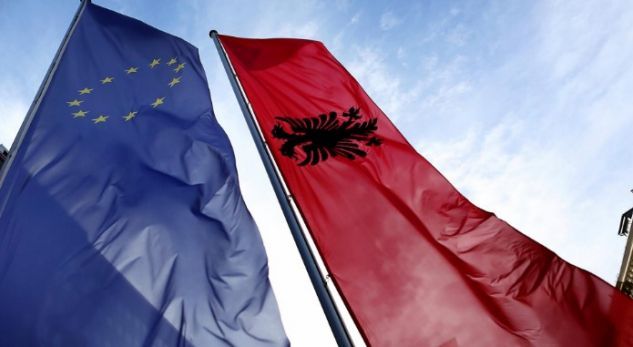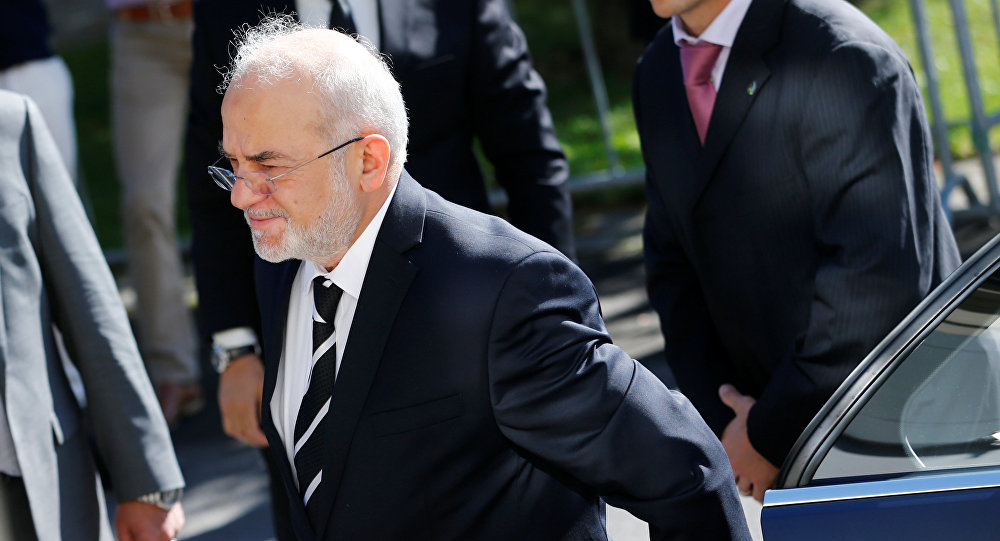EU Observer (14 April 2018)
Germany's socialist foreign minister just said the EU should "step up pressure" on Russia. Its chancellor aired "political" doubts on a Russian pipeline. But is the new coalition really more hawkish than the last one?
Heiko Maas, the minister, spoke out while in the EU capital on Friday (13 April).
He backed Western military strikes on Russia's ally, the Syrian regime .
"The repeated use of chemical weapons cannot be left unanswered," he said, referring to Syrian leader Bashar al-Assad's latest attack on civilians.
He spoke in favour of new sanctions on Russia for protecting Assad by wielding its UN veto.
"We need to keep up political pressure on Russia and we'd like to step it up even further because Russia needs to be prompted to change its behaviour," Maas said.
He also backed Russia sanctions more broadly.
"What we have seen from Russia in the past months and weeks - Ukraine, Salisbury, Syria, hacker attacks … or interference in democratic election processes in the West, all this requires a clear answer," he said, referring to Russia's chemical attack in Salisbury, UK.
The foreign minister sounded more hawkish than his predecessors in Germany's previous coalition, the SPD's Sigmar Gabriel and Frank-Walter Steinmeier.
They also took a principled stand over the Ukraine conflict and on previous US strikes in Syria, but both men were better known for urging "dialogue" with Russia in the EU Council than for advocating extra "pressure".
The previous coalition also backed a new Russia-Germany gas pipeline, Nord Stream 2, despite EU and US concerns.
But Germany's conservative chancellor, Angela Merkel, last week, raised "political" questions over the project, breaking with her former line that it was a purely "economic" one.
"The Nord Stream 2 project is not possible without clarity of how Ukraine's transit role will continue … political factors must be taken into account," she said in Berlin, pointing to the risk that Russia could use the pipeline to cut off Western allies.
Tone or substance?
For one expert, Maas' remarks on Friday showed that the SPD's "tone" on Russia had "changed a bit, but not the substance".
The party, in Gabriel and Steinmeier's day, also "stood by the transatlantic alliance, to defend a rule-based international system" when it came to "serious security questions", Andreas Goldthau, an international relations professor at the Royal Holloway University of London, told EUobserver.
But for another expert, Russia will find it harder to get along with Maas than it did with the party's old guard, a group epitomised by Gerhard Schroeder, a former chancellor who went to work as a Kremlin consultant.
"Maas is from a new generation in the SPD … who have no historical and personal links with Russia and a very rational and pragmatic view on Russia," Stefan Meister, a Russia scholar at the German Council on Foreign Relations, a think tank in Berlin, said.
"He [Maas] is much more a rule of law and human rights person, close in his assessment on Russia to Merkel," Meister said.
This "will shift German policy on Russia" and "change the rhetoric of the German foreign ministry," he said.
EU foreign ministers aim to discuss Russia at a meeting in Luxembourg on Monday in the aftermath of the British, French, and US strikes in Syria this weekend.
"Many things can happen until then … If something happens during the weekend, we'll have to adapt to it," an EU diplomat said, referring to the risk of escalation.
The ministers planned to voice "crystal clear" condemnation of Assad's chemical attack and to discuss "going further, toward sanctions" on Russia and Syria, the diplomat said.
They also planned to discuss the Ukraine conflict and areas for "selective engagement" with Russia, he added.
Litmus test
Nord Stream 2 was not on Monday's agenda, but ministers were likely to ask Maas where he stood on the project in light of Merkel's remarks, the diplomat said.
For some allies, the pipeline is a litmus test of whether Germany is really willing to put pressure on Russia.
But for the Nord Stream 2 consortium Merkel's comment on Ukraine represented nothing new.
"The position of the German government on Nord Stream 2 and the future role of transit through Ukraine has been known since the project's inception in 2015," the consortium's Sebastian Sass told EUobserver.
"Outstanding permit decisions [by Denmark and Sweden] are expected in the next months, allowing us to start construction this year," Sass said.
The current German coalition was no more likely to halt the pipeline than the old one despite the "new generation" in the SPD, Goldthau and Meister, the German experts, also said.
"I don't read Merkel's statement as an objection in principle to Nord Stream 2, but it opened the door for Ukraine to remain a transit country post-2019," Goldthau said.
"No change [on Nord Stream 2] on the German political side," Meister said.
"Merkel is getting more angry with Russia because of Salisbury, a cyber attack on the German foreign ministry, and the chemical weapon attack in Syria, but she is still not willing to stop the project," he said.
"If nothing serious happens with Russia, it will come and the German government will support it," he said.
No comments yet.
-
 EUROPEAN UNION TO OPEN ACCESSION NEGOTIATIONS WITH ALBANIA
The Balkans
17.04.2018
EUROPEAN UNION TO OPEN ACCESSION NEGOTIATIONS WITH ALBANIA
The Balkans
17.04.2018
- CHINESE BID TO BUILD PELJESAC BRIDGE BRINGS BENEFITS TO CROATIA: FORMER CROATIAN PRESIDENT The Balkans 17.04.2018
- ROMANIAN PRESIDENT REJECTS GOVERNMENT CALL TO SACK TOP ANTI-GRAFT PROSECUTOR The Balkans 17.04.2018
- INTER-KOREAN SUMMIT SEEN AS OVERTURE TO KIM JONG-UN’S MEETING WITH TRUMP, EXPERT SAYS Asia - Pacific 17.04.2018
-
 IRAQ SAYS CONFLICTS OF INT’L POWERS, SPECTER OF WAR SHOULD REMAIN OUT OF SYRIA
Iraq
17.04.2018
IRAQ SAYS CONFLICTS OF INT’L POWERS, SPECTER OF WAR SHOULD REMAIN OUT OF SYRIA
Iraq
17.04.2018
-
25.01.2016
THE ARMENIAN QUESTION - BASIC KNOWLEDGE AND DOCUMENTATION -
12.06.2024
THE TRUTH WILL OUT -
27.03.2023
RADİKAL ERMENİ UNSURLARCA GERÇEKLEŞTİRİLEN MEZALİMLER VE VANDALİZM -
17.03.2023
PATRIOTISM PERVERTED -
23.02.2023
MEN ARE LIKE THAT -
03.02.2023
BAKÜ-TİFLİS-CEYHAN BORU HATTININ YAŞANAN TARİHİ -
16.12.2022
INTERNATIONAL SCHOLARS ON THE EVENTS OF 1915 -
07.12.2022
FAKE PHOTOS AND THE ARMENIAN PROPAGANDA -
07.12.2022
ERMENİ PROPAGANDASI VE SAHTE RESİMLER -
01.01.2022
A Letter From Japan - Strategically Mum: The Silence of the Armenians -
01.01.2022
Japonya'dan Bir Mektup - Stratejik Suskunluk: Ermenilerin Sessizliği -
03.06.2020
Anastas Mikoyan: Confessions of an Armenian Bolshevik -
08.04.2020
Sovyet Sonrası Ukrayna’da Devlet, Toplum ve Siyaset - Değişen Dinamikler, Dönüşen Kimlikler -
12.06.2018
Ermeni Sorunuyla İlgili İngiliz Belgeleri (1912-1923) - British Documents on Armenian Question (1912-1923) -
02.12.2016
Turkish-Russian Academics: A Historical Study on the Caucasus -
01.07.2016
Gürcistan'daki Müslüman Topluluklar: Azınlık Hakları, Kimlik, Siyaset -
10.03.2016
Armenian Diaspora: Diaspora, State and the Imagination of the Republic of Armenia -
24.01.2016
ERMENİ SORUNU - TEMEL BİLGİ VE BELGELER (2. BASKI)
-
AVİM Conference Hall 24.01.2023
CONFERENCE TITLED “HUNGARY’S PERSPECTIVES ON THE TURKIC WORLD"









